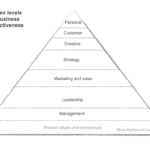There are skills, qualities and traits in business that appear to be inherent or based on wisdom, rather than capable of being more rapidly learned. By thinking in this way we fail to sufficiently challenge ourselves to analyse how to learn these skills, qualities and traits. Intuition in decision making is one of the leading examples where perfectly rational business leaders ... Read More »
Strategy & Plans
Feed Subscription<The CEO’s Quick Guide to Creating an Innovation Culture
‘Innovation’ and ‘culture’ as individual concepts are sufficiently difficult to achieve that they warrant stacks of books on the subject from lots of well informed professionals. Put the two words together as an objective to be achieved, and the CEOs of even the most sophisticated global companies will pale slightly. The problem is that to create an innovation culture within any ... Read More »
Your Business Model is Breaking: 8 Ways to Keep It Evolving
‘A business model describes the rationale of how an organization creates, delivers, and captures value’. It is ‘a blueprint for a strategy to be implemented through organizational structures, processes and systems’ such that being able to manipulate business models enables you to ‘create new strategic alternatives’ for your organization – Business Model Generation, Osterwalder & Pigneur They describe in their ... Read More »
A simple explanation of business intelligence and big data
You grow through experience and learning. Your skills and wisdom are accrued through action and feedback loops. Education and learning & development programmes significantly supplement experience, but it is mainly embedded as usable knowledge through application. Most of the ways in which you think and act are based on your knowledge and skills. Your brain and external brains – embedded ... Read More »
Creativity and artistry in business and why it’s important
Most things can be copied. It’s not long before your latest innovations are repackaged and enhanced by your competitors. Your new commercial model in a couple of years is a market norm. Pricing, packaging, positioning and the same supply chain are all accessible. Even your people are effectively buyable commodities unless you set a mission above profit that engages with ... Read More »
How to assess your 7 levels of business effectiveness
The seven levels of business effectiveness represent the core areas that a business leader should focus on in order to do better in business. Importantly, they should be considered from the top of the pyramid down as they are connected and interact with each other. Unfortunately for you, when your effectiveness at any of these levels is suboptimal, they become ... Read More »
How to Use Heuristics in Problem Solving and Minimise Errors
The word heuristics comes from the Greek “find” or “discover” and refers to experience-based techniques for problem solving, learning, and discovery – Wikipedia. Judea Pearl in ‘Heuristics: Intelligent Search Strategies for Computer Problem Solving’ defines heuristics as strategies using readily accessible, though loosely applicable, information to control problem solving in human beings and machines. Intuition is closely related to heuristics because intuition can be interpreted as layers of ... Read More »
 Constant Mentor Goal Setting & Interventions for Leaders
Constant Mentor Goal Setting & Interventions for Leaders








